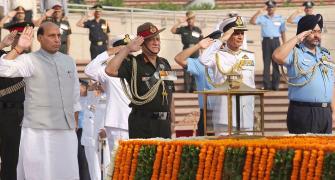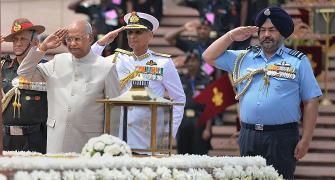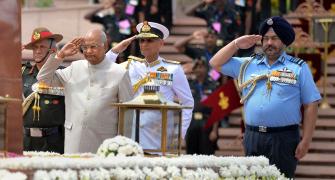Even as the decision to create the CDS was bold, coming as it did in the face of quite a serious opposition, one hopes the position will not become a merely ornamental one and carry with it the authority and punch that it must have, writes Premvir Das.

From the ramparts of the Red Fort, no less, Prime Minister Narendra Modi declared on Independence Day that India would have the CDS.
He further said this would help in integrating the armed forces consistent with the needs of the time.
It is now well known that following the Kargil War, a committee (KRC) headed by the late K Subrahmanyam was constituted by the Vajpayee government to review the entire security apparatus.
The KRC made several recommendations, of which an important one concerning higher defence management was to create the CDS.
Following this, a group of ministers headed by the deputy prime minister was appointed.
The group, in turn, constituted four task forces covering different aspects of national security.
One of these was on higher defence management, chaired by former minister of state for defence Arun Singh.
This writer was the only retired member of this group, the other eight being serving civil and military officers.
The Arun Singh committee, as it became known, conferred with a wide spectrum of senior civil and military persons, serving and retired.
These included six defence secretaries and as many as 17 former chiefs of the three services as also those who had occupied high positions in defence research and development and production.
There was considerable interaction with service headquarters and the ministry of defence, as also with the other three task forces dealing with intelligence, border management, and internal security; all these three comprised only retired officials who had held high decision-making positions in government.
Taking just four months, these groups presented their proposals to the GoM at a meeting at which I was present and, as I recall, all of those made by the Arun Singh task force in regard to higher defence management were accepted by the GoM and became part of its recommendations.
The most important of these was the creation of the Chief of Defence Staff.
At this stage, it may be pointed out that all the air force chiefs with whom we interacted objected vehemently to the CDS concept, saying that this would adversely affect the ethos and fighting efficiency of the services.
In the bureaucracy of the ministry of defence, there was negativity because there was a sense that it would act to the detriment of their own role in decision making.
Treading these turbulent waters, Arun Singh had to make calibrated recommendations.
Our group, therefore, proposed that the CDS should handle all planning, doctrine, and force development functions, and also oversee Intelligence, leaving the individual service chiefs with control of operations.
It was felt that with the passage of time the spectrum of his control would be readjusted.
This was a major compromise which still did not succeed in getting past the then prime minister, who, as quoted in a recent book by then naval chief admiral Sushil Kumar, ended the meeting by saying "iske baare mein aur sochna padega (need to think something else)".
This is where the matter has been for the past 18 years.
Modi has caught this bull by the horns and all kudos to him for doing so.
But this is not the end, only a beginning.
The prime minister mentioned that all major armed forces -- he specifically referred to the United States -- have the CDS.
Yes, indeed, but the CDS in that country and most others -- the United Kingdom, France, Russia, China, to name only four -- does not oversee planning and force development, which are left to individual service chiefs, but controls operations.
This makes sense because that is where being joint and integrated, both stressed by the prime minister, is essentially required.
It is only in Pakistan that the CDS handles these important but mundane tasks, but the chiefs, mainly that of the army, who call the shots.
It is not surprising that most of India knows the name of the Pakistan army chief but not that of the CDS.
Hopefully, our CDS-to-be will not be placed in that category.
So, even as the decision to create the CDS was bold, coming as it did in the face of quite a serious opposition, one hopes the position will not become a merely ornamental one and carry with it the authority and punch that it must have.
Only control of operations can provide both.
One can be certain that this change will be resisted by the service chiefs, who will see it as encroachment on their turf but, as I have said, the prime minister has the chutzpah to deal with them.
Integral to the CDS concept is the placement of operational theatre commands under his charge.
Between them the army, the navy and the air force have as many as 12 of these, to which should be added the Andaman and Nicobar command and strategic command with two more reportedly in the pipeline.
Having quoted the American example of working their higher defence management, we should also go that way.
The existing method of functioning has long been overdue overhaul and a great opportunity has come our way to set this house in order.
And, if one sensed the prime minister right, he will ensure he walks the talk.
Premvir Das was member of the Task Force on Higher Defence Management. He has also served on the National Security Advisory Board.











